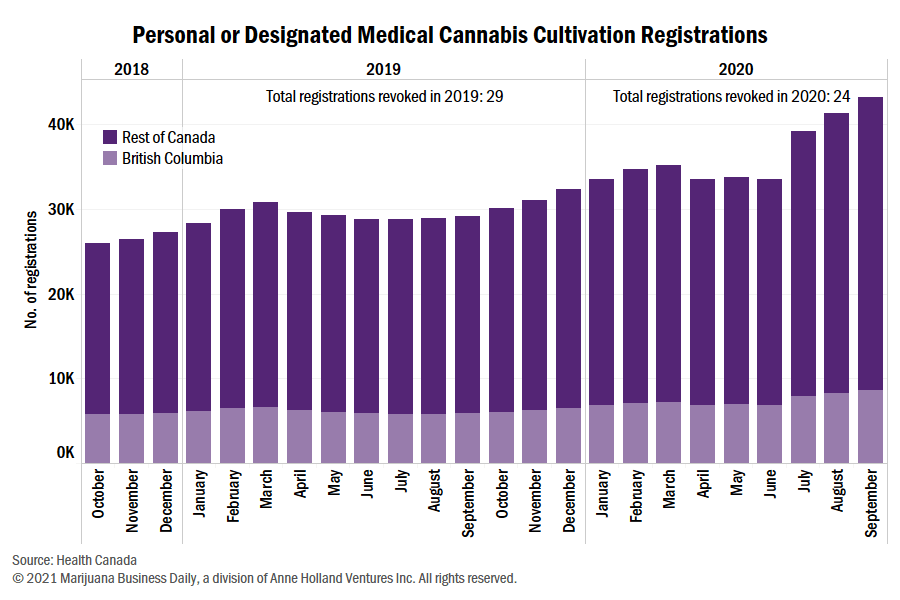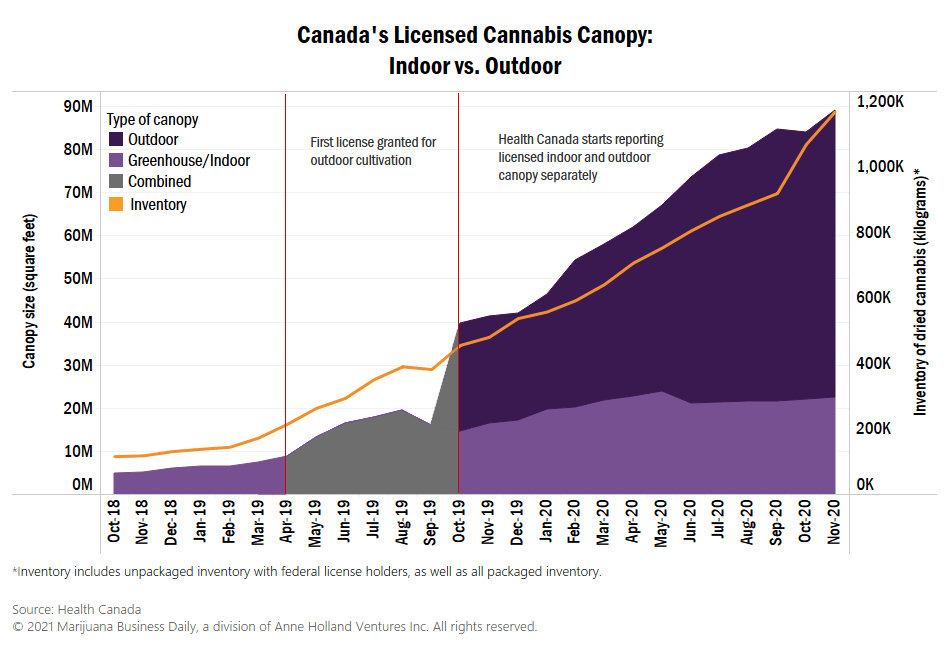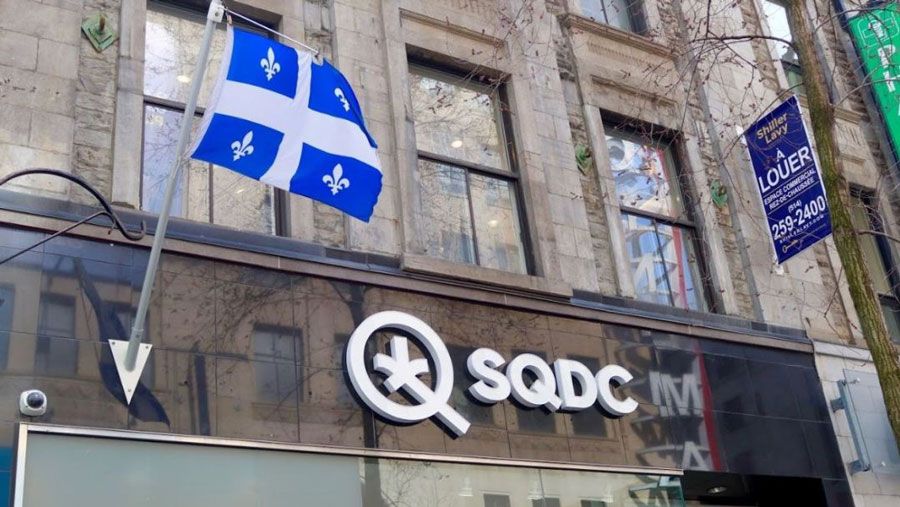British Columbia is pressing Canada’s federal government to revamp the country’s home medical cannabis cultivation program, calling some instances of authorized home production a significant source for the illegal market.
“We know the program allows patients to produce their medicine at a lower cost than they can buy it, but we also know there is significant abuse, and that cannabis grown by medical growers is a significant source of illegal market cannabis,” the office of B.C. Public Safety Minister Mike Farnworth told Marijuana Business Daily in a statement.
“We would also like to see the federal government re-think the medical access program, in particular personal and designated production,” the ministry’s statement said.
Some legal businesses, too, have said alleged diversion has a negative impact on their bottom lines.
But other industry sources downplayed that claim, saying any diversion is exaggerated and there is no clear data to suggest otherwise.
Any impact from potential changes on the regulated and unregulated markets for medical cannabis is unclear as no specific amendments to the current rules have been proposed by Ottawa.
Canada’s medical program allows patients to receive cannabis directly from licensed producers.
Part of that program also allows patients to grow a specific number of marijuana plants for their own medical use, depending on how much they’re prescribed by a doctor and pending approval by Health Canada for each site, or to designate someone else to grow it for them.
Health Canada reported roughly 43,211 registrations for personal or designated medical production as of September 2020, the latest month of available data.
Roughly 8,590 of those are in British Columbia.
The ministry provided MJBizDaily with written responses to questions in lieu of a phone interview with the minister.
British Columbia concerns
The B.C. government was clear it does not want to see the broader medical cannabis regime eliminated altogether, acknowledging that many patients legitimately grow marijuana for their own use as a more affordable option than buying medicine from a licensed producer.
“However, we have serious concerns about the volume of cannabis some users are authorized to produce and the lack of oversight once an authorization is issued,” the B.C. public safety ministry said in written answers to follow-up questions.
The ministry said some medical users are authorized to use in excess of 100 grams of cannabis per day, which would allow them to grow more than 5oo plants indoors or 200 plants outdoors, based on the conversion formula set out in federal regulation.
And since regulations allow medical cannabis to be grown for up to four individuals at one site, “potentially thousands of plants can be grown in one location – in other words, (it is) a commercial scale operation,” the ministry said.
The province claimed that personal and designated medical marijuana production sites are sometimes established in residential neighborhoods “where they can have a massive impact on neighbors, and unlike commercial operations, there are few rules about how the cannabis is grown.”
That creates “significant challenges” for local authorities as well, the province noted.
“All of which is to say that while we appreciate the benefits of allowing medical users to produce their own cannabis, the way the medical program currently operates has significant and unacceptable impacts on the broader community.”
The ministry said it is encouraged that Health Canada “appears to be taking early steps” to address some of the issues it has with the program.
As examples, the ministry cited:
- Initial steps taken by the federal health department to use its authority to refuse or revoke authorizations on public health and safety grounds.
- An effort by the federal government to contact physician regulatory bodies across Canada “where it has concerns about doctors who are authorizing very high daily amounts.”
“We think the program requires comprehensive review and reform, and we are encouraging the federal government to undertake that work on a priority basis. The B.C. Cannabis Secretariat raises these concerns with Health Canada at regular meetings, and we are committed to supporting the federal government in any program review.
“Minister (Farnworth) has also raised these concerns with his federal counterparts.”
‘Rhetoric, not reality’
Kirk Tousaw, a former lawyer who fought a previous government ban on home cultivation of medical cannabis, said any diversion from the legal medical market to the illicit market is immaterial.
Tousaw was part of the legal team that successfully fought a legal battle in 2016 to overturn a federal ban on home cultivation of medical marijuana.
“The reality is diversion from personal and designated producers is not actually a big deal. It’s not impacting anything. But by trying to crack down on it, you’re going to harm a lot of patients, and that will be a big deal,” said Tousaw, now CEO of micro-cultivator Great Gardener Farms in Cowichan Valley, British Columbia.
The Royal Canadian Mounted Police (RCMP), the federal police service, did not tell MJBizDaily how many personal or designated medical marijuana production sites were the focus of police action in 2019 and 2020, making claims the system is being abused hard to verify.
British Columbia said it does not have such data, and Health Canada did not provide the data by MJBizDaily‘s deadline.
Provincial and police sources have cited only anecdotal evidence, such as large individual police raids.
Max Monahan-Ellison, board member of patient advocacy group Medical Cannabis Canada, said the missing data is key to understanding the extent of any diversion that might be happening.
Health Canada logged 23 instances of “registration revocations” for personal or designated production last year – a small number considering the 43,211 registrations.
“Show me the data so we can understand the extent to which this is a problem,” he said.
“Let’s make sure we don’t end up punishing a large group of patients for the actions of a few.”
Regarding instances of police enforcement against alleged abusers of medical production licenses, Tousaw said, “Is it less than 0.01% of all the licenses out there? Are there more than 43 of these cases in all of the country? It doesn’t seem like it.”
“If Health Canada wants to help patients and preserve public safety, there’s a lot of ways to do it that don’t involve restricting patients’ rights,” he said,
“The lens that we need to be looking at this through always has to put the patient as the primary stakeholder, not law enforcement and not the recreational market.”
Matt Lamers is Marijuana Business Daily’s international editor, based near Toronto. He can be reached at matt.lamers@mjbizdaily.com.





